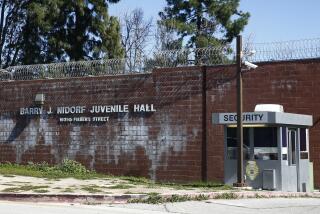Troubles With Computers Illustrate Crisis
For proof that California’s child support program is in crisis, observers say, look no further than its calamitous experience with computerization.
After spending $171 million on a system that has now been scrapped, California is requesting $312 million from the federal government to replace it. That system, despite its eye-catching price tag, is intended to last only a few years--until still another system is designed.
“The [computer] failure and its aftermath clearly show that there is no control of California’s child support program,” said Leora Gershenzon at the National Center for Youth Law in San Francisco.
A decade ago, the federal government required every state to build a computer system to improve its child support collections. The mandate was especially important in California, because some counties were using archaic computers, and some only paper.
In 1992, California contracted with Lockheed IMS to build the computer system. And though administration officials say the system’s failure was Lockheed’s fault, a report by the state auditor found plenty of blame to be spread around.
“A cascade of events” led to the failure, the report said. Among them: The project was transferred, midstream, from the Department of Social Services to the state’s Health and Welfare Data Center, an agency that the auditor found was not up to the task. Warning signals from quality control contractors and Lockheed itself were ignored. And the counties simply would not unify behind the system.
California child support director Leslie Frye maintains that the system was a “vendor failure” and refuses to discuss it, citing arbitration between the state and Lockheed since the contract was severed last year. Gov. Pete Wilson’s office did not return a call seeking comment.
Lockheed officials blame the system’s failure on the state government’s inability to control district attorneys.
“There just wasn’t a strong, cohesive decision-maker at the state level,” said Lockheed IMS Vice President Julie Sgazi.
Sgazi complained that the state employed six different project managers during the five-year project. Individual district attorneys insisted that they wanted the system customized to fit the way they handled cases--for instance, some wanted every case assigned to a specific caseworker, others wanted them scattered throughout the office.
The state terminated its contract with Lockheed in the fall of 1997.
“If you talk to people from other states, they refer to California as a black hole if their cases go there,” said a congressional staffer who is involved in child support. “It’s kind of fascinating that the state with Silicon Valley can’t get a computer program.”
*
It is what happened after the system was pronounced dead that critics say best illustrates the clout wielded by the district attorneys who oversee child support collections.
Prosecutors proposed that the state use seven different computer systems that the district attorneys would provide--rather than the single, unified system demanded by the federal government. The district attorneys’ systems would be networked together.
After much battling in Sacramento and an appeal by the district attorneys that Wilson use his influence to secure their seven systems, the Legislature whittled the number down to four: the Los Angeles system, which the federal government had already paid for, plus three others. The proposed cost for that interim system and planning its eventual replacement is $312 million.
The federal government, skeptical of any proposal for more than a single statewide system, has yet to sign off on the project.
“I see the D.A.’s wagging the dog,” said Assemblywoman Dion Aroner (D-Berkeley). “This is a problem.”
Frye, the state’s child support director, said the new arrangement makes the best of a bad situation. “This is a fallback position,” she said, referring to the fact that California faces millions of dollars in federal penalties without an operational computer system. “It’s not the textbook way, it’s not the first choice of anybody involved.”
But it is proof, advocates say, that California’s child support program is not only leaderless but driven only by political pressure.
“If these kids were voters . . . if they had some political clout, they would not be the victims of this year after year,” said Barbara Grob, director of the Child Support Reform Initiative, a coalition of activist groups pushing to alter the state’s program.
“Imagine if the Social Security system broke down tomorrow and senior citizens didn’t get their checks,” Grob said. “You can bet that they would get a computer system up and running.”
More to Read
Sign up for Essential California
The most important California stories and recommendations in your inbox every morning.
You may occasionally receive promotional content from the Los Angeles Times.









